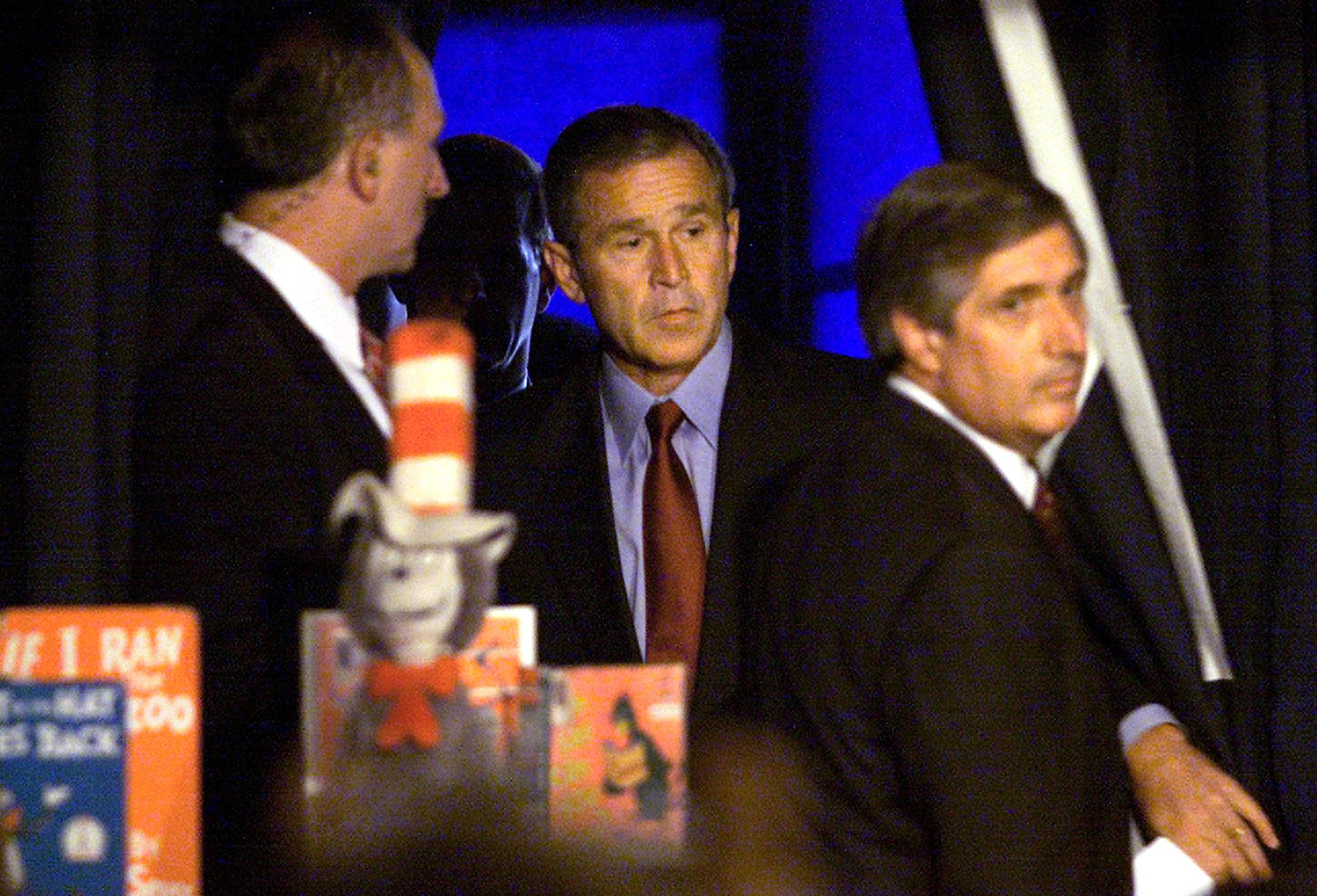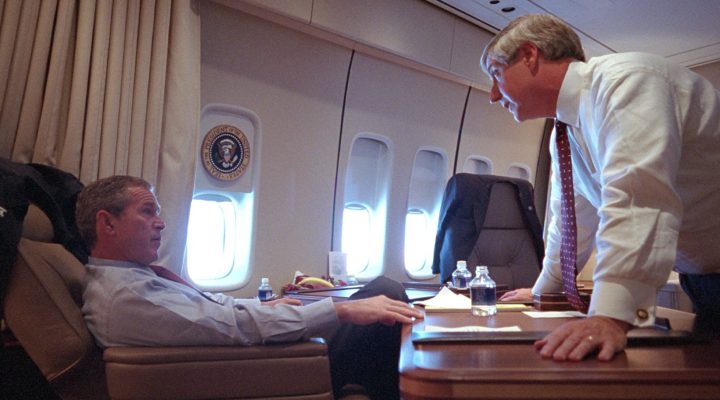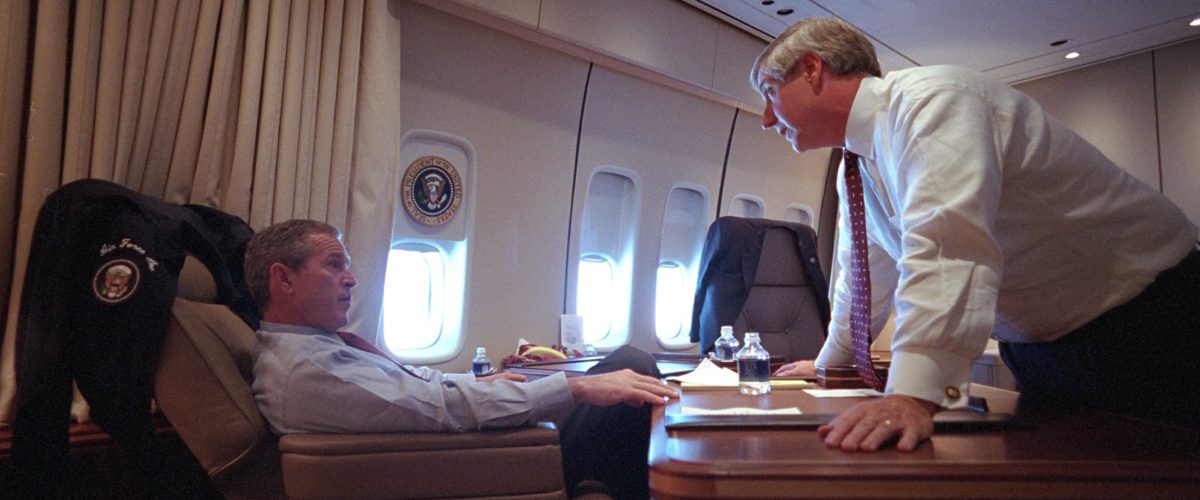Andy Card, the second longest-serving White House chief of staff in American history, sees one word in the U.S. Constitution as most important.
“We live in a great country, and the most important word in our Constitution happens to be the very first word, WE,” said Card, who served under George W. Bush from 2001 to 2006 and currently serves as CEO of the George and Barbara Bush Foundation.
He believes that over the last few years, the American political system has lost the power of “we” that was instilled in him by his grandmother growing up in rural Massachusetts. Card remembers a photo in his grandmother’s living room with women in white dresses, walking down Commonwealth Avenue in Boston in a parade fighting for the right to vote.
He believes the American political system has lost the power of “we.”
He recalls his grandmother being very proud that she was in that photograph.
Growing up, Card spent quite a bit of time with his grandmother, who lived right next door to his family. She taught him politics is not a dirty word, but instead is essential to recognize that “we, the people” are the grounding of our politics in this country.
“She would say that the Constitution is a remarkable document, but it’s an invitation,” he recalled. “You’re not obligated to do anything unless you accept the invitation.”
As a young man, Card decided to accept the invitation to step into the role of politics and eventually worked with former President Ronald Reagan and both Bushes. Although he already had served under two White House administrations, he was surprised to be appointed chief of staff to George W. Bush. Assuming President George W. Bush would choose a chief of staff from Texas, Card initially thought the president was asking him to run his transition team.
“I was blessed to work with three presidents who invited me to have the courage to speak truth to power,” he said.
He enjoyed the role of chief of staff and remembers fondly, “It’s not a 9-to-5 job. It starts very early in the morning and goes until late at night, and you get calls in the middle of the night.” He knew to do the job well would require strong faith.
Card’s wife is a former United Methodist Church pastor who has helped shape his faith.
Philippians 4:8 was his go-to verse every day when he walked into the White House: “Whatever is true, whatever is honorable, whatever is just, whatever is pure, whatever is pleasing, whatever is commendable, if there is any excellence and if there is anything worthy of praise, think about these things.”
He wanted to make sure the president was greeted with an optimistic, positive attitude. So, he would say “Top of the morning, Mr. President, it’s going to be a great day.” Card was passionate about being contagious with optimism to send the message that following the president would make things better.

President George W. Bush steps through a curtain led by his Chief of Staff Andrew Card (R) to address the nation shortly after news of the New York City airplane crashes was avaiable in Sarasota, Florida, September 11, 2001. (PAUL J. RICHARDS/AFP via Getty Images)
That optimism helped carry Card through 9/11. He sorrowfully recalls the day at an elementary school in South Florida when he had the task of telling the president that the United States was under attack.
“My mind flashed to the fear that the passengers on the plane must have had, they had to know it was losing altitude, and then I can remember a staffer coming to me to let me know that a second plane had hit the World Trade Center,” he recalled.
“I opened the door and stepped into the classroom as the students were in the middle of a dialogue with the president and, at first, the president did not see me coming. I leaned down and whispered into his right ear that America is under attack.”
Like Card, the first President Bush, George H.W. Bush, was an optimist, he said.
“He was an optimist and a pragmatist, empathetic to the burdens that were carried by people who had to live with his decisions.”
Card also describes the elder Bush as phenomenally disciplined about how he practiced his faith during his presidency, but also, as a truly compassionate conservative who wanted to make a positive difference in the lives of the American people.
Today, Americans must remain in involved, he said.
“People need to be involved and don’t stand on the sidelines and shout bad words. Get into the parade and demonstrate unity and commonality. I always tell people who serve in elective office that you represent everyone in your constituency, not just the people who vote for you.”
Editor’s note: This interview was conducted before the Nov. 5 U.S. elections.


